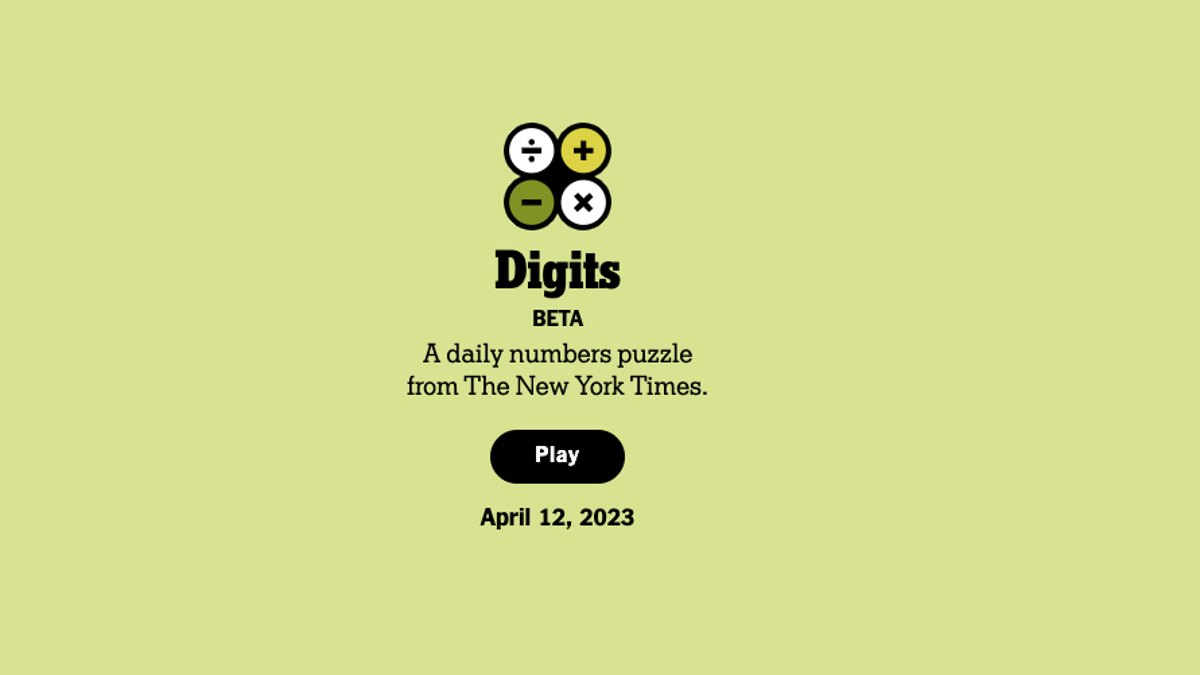Welcome to the fascinating realm of digits! From the moment we wake up and check the time on our digital clocks to navigating through a world increasingly driven by data and technology, it’s hard to deny the impact that numbers have on our daily lives. In this blog post, we will explore the profound influence that digits hold over us and how they shape our perspectives in ways we may not even realize. So grab your calculators and prepare for an eye-opening journey into Digits NYT – where numbers come alive!
What are digits NYT?
Digits NYT, at their core, are the building blocks of numbers. They represent numerical values and allow us to quantify and measure the world around us. From the familiar 0 to 9, these seemingly simple symbols hold immense power in our daily lives.
But digits are more than just mathematical tools. They have evolved into their own language, communicating information quickly and efficiently. Whether deciphering an address or reading a phone number, we rely on digits to convey precise details that words alone cannot express.
In today’s digital age, digits have taken on even greater significance. With the rise of technology and data-driven decision-making, numbers have become integral to understanding complex systems and patterns. Digits enable scientists to analyze vast amounts of information, helping us make sense of everything from climate change to market trends.
Moreover, digits also play a crucial role in communication across borders and cultures. While spoken languages may differ worldwide, numbers offer a universal means of understanding quantities and measurements. Digits easily bridge linguistic barriers when discussing trade agreements or sharing scientific research findings.
Digits NYT are a powerful tool for human cognition by simplifying complex concepts into concise representations. They allow us to quantify our experiences and gain insights that shape how we perceive the world. So, let’s delve deeper into this fascinating realm where numbers come alive – exploring the profound impact that digits can have on our perspectives!
What do digits do for us?
What do digits do for us? They may seem like symbols or numbers, but they play a crucial role in our daily lives. Digits provide a universal language of counting and measuring, enabling us to quantify and understand the world around us.
Digits NYT are the foundation of mathematics, allowing us to perform complex calculations and solve problems. From basic arithmetic operations to advanced equations, digits are essential tools for scientific research, engineering developments, financial analysis, and more.
In addition to their mathematical significance, digits facilitate communication and information sharing. We rely heavily on numerical data for various purposes in this digital age. For instance, statistics help policymakers make informed decisions about public health initiatives or economic strategies.
Moreover, digits contribute to our understanding of time and space. We use them to tell time accurately using clocks or measure distances precisely with rulers or GPS systems. Numbers enable us to navigate through the physical world efficiently.
Furthermore, they have transformed industries like marketing and advertising by providing valuable insights into consumer behaviour through data analytics. Companies can track sales figures and customer preferences using numerical metrics generated by digitized systems.
It is undeniable that digits hold immense power in shaping how we perceive and interact with the world. Understanding their capabilities allows us to harness their potential for personal growth and societal progress.
The power of digits
The power of digits lies in their ability to convey information and shape our understanding of the world. Digits are more than just numbers; they represent quantities, measurements, and data that can be analyzed and interpreted. They provide a universal language that allows us to communicate complex concepts precisely.
Digits NYT have revolutionized numerous fields, from mathematics to finance to technology. They enable scientists to quantify phenomena, economists to analyze market trends, and engineers to design intricate systems. In the digital age, digits fuel innovation by facilitating the storage and manipulation of vast amounts of information.
Moreover, digits hold immense influence over our everyday lives. We use them for everything from tracking time with clocks and calendars to managing finances through bank accounts. Numbers allow us to measure distances when navigating or cooking recipes when preparing meals.
In addition, digits play a vital role in shaping our perspectives on various topics. For instance, statistics presented as percentages or numerical comparisons can sway public opinion on social issues or politics. The way data is represented using digits can create biases or misinterpretations if not carefully considered.
Furthermore, social media platforms utilize algorithms based on user engagement metrics (such as likes and followers) represented by digits, which impact what content we see and how we perceive it. These seemingly insignificant numbers can greatly influence popularity dynamics and shape societal trends.
In conclusion
Digits are not mere symbols but powerful tools that shape our understanding of the world around us. From providing precise measurements in scientific research to influencing public opinions through statistical representation, these numerical representations undeniably impact our perspectives.
What we can learn from digits
What can we learn from digits? A lot more than you might think. Digits, those small numerical symbols that make up our number system, hold a wealth of information and insights if we take the time to examine them closely.
Digits can teach us about patterns and trends. We can uncover recurring sequences or fluctuations over time by analyzing numbers. This helps us identify regularities in various phenomena, such as stock market performance or weather patterns.
Digits provide a way to measure and quantify the world around us. From distances to temperatures to quantities of ingredients in a recipe, numbers allow us to make precise calculations and comparisons. They give structure to our observations and enable us to communicate information accurately.
Moreover, digits play a crucial role in scientific research and discovery. Scientists use numerical data for experiments, statistical analyses, and modelling complex systems – all essential to advancing knowledge in physics, biology or economics.
Additionally, understanding digits allows us to navigate the digital landscape effectively. In an increasingly digitized world where technology is pervasive across industries and daily life activities, numerical literacy empowers individuals with critical skills for success.
In conclusion,
Digits are not just arbitrary symbols on a page but powerful tools that shape our understanding of the world. By delving into their patterns, using them for measurement, relying on them for scientific exploration, and embracing them in digital contexts, We unlock new perspectives and gain invaluable insights into how things work. So, next time you see a string of numbers, Please take a moment to appreciate the knowledge they hold and consider what you can learn from their presence
How digits impact our perspectives
Digits undeniably impact our perspectives, shaping how we perceive and understand the world around us. They provide a numerical framework through which we interpret information and make sense of complex concepts.
One way in which digits impact our perspectives is by quantifying data. Numbers allow us to measure and compare different variables, providing a tangible basis for analysis. Whether it’s measuring time, distance, or quantities, digits give us a common language to communicate and comprehend these abstract notions.
Moreover, digits can influence our judgment and decision-making processes. Specific numbers or statistics can sway our opinions or perceptions about particular issues. For example, studies have shown that people are more likely to be persuaded by statistics presented as percentages rather than raw numbers.
Additionally, digits play a crucial role in shaping our understanding of probabilities and risks. The presentation of statistical information using percentages or ratios affects how we evaluate potential outcomes or dangers associated with different scenarios.
Furthermore, social media platforms have made numbers more prominent in our daily lives than ever before. Likes, shares, and followers contribute to an individual’s online presence and perceived popularity. This digitized form of validation can subtly shape our self-worth and influence our online and offline behaviours.
In conclusion (not summarizing), digits hold significant power over how we perceive the world. From quantifying data to influencing decisions and even affecting our self-esteem in the digital realm, numbers shape what we know and how we feel about that knowledge.
Conclusion
Numbers have always played a significant role in shaping our perspectives and understanding of the world. Digits have been instrumental in quantifying and interpreting information from the earliest civilizations to modern societies.
In this digital age, where data is abundant and easily accessible, the impact of digits has only intensified. They help us make sense of complex concepts, analyze trends, and make informed decisions. Numbers provide a universal language that transcends barriers and allows for effective communication across cultures.
But it is crucial to remember that while digits are powerful tools, they are not infallible. Using them critically and contextualizing their meaning within the broader narrative is essential. Digits can be manipulated or misinterpreted, leading to biased perspectives or misleading conclusions.
As information consumers, we must be mindful of how numbers are presented. When reading articles like The Impact of Digits NYT: How Numbers Shape Our Perspectives’, it’s essential to consider the source’s credibility and potential biases.
By developing a critical eye toward numbers, we empower ourselves to navigate an increasingly data-driven world more effectively. We become better equipped at spotting misinformation or skewed interpretations that may influence our judgments.
So next time you encounter digits in news articles or research papers – whether about economic growth rates or public health statistics – take a moment to question their origin and implications. Seek out multiple sources with different perspectives for a more comprehensive understanding.
In doing so, we can harness the power of digits while maintaining a discerning mindset that safeguards against manipulation or misunderstanding. By embracing numeracy as an essential skill set in today’s society, we open ourselves to new insights and possibilities while staying grounded in objective reality.
The impact of digits on our perspectives cannot be underestimated; however, by being vigilant consumers of numerical information, we can ensure that these impacts lead us toward knowledge rather than misconceptions.





